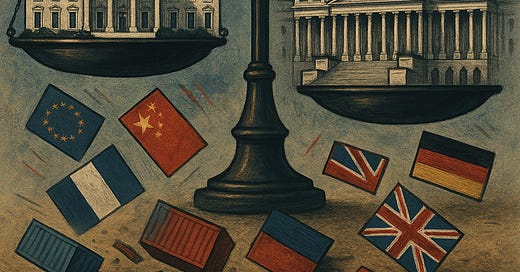Can the President Really Impose Tariffs on His Own?
Unpacking the Constitutional Powers, Statutory Limits, and Congress's Role in U.S. Tariff Wars
During the last three months, we have witnessed the biggest tariff war since the beginning of the 20th century. Former President Donald Trump has applied tariffs affecting up to 150 countries, shaking global markets and sparking intense political and legal debates. But can a U.S. President unilaterally impose tariffs, and what are the constitutional and statutory limitations?
Presidential Authority to Impose Tariffs
At first glance, the U.S. Constitution explicitly assigns tariff-setting powers to Congress under Article I, Section 8, granting the legislative branch the authority "to lay and collect Taxes, Duties, Imposts and Excises" and "to regulate Commerce with foreign Nations." However, historical shifts since the Great Depression, particularly following the controversial Smoot-Hawley Tariff Act of 1930, have led Congress to delegate significant portions of this authority to the executive branch.
Today, the President relies on specific statutory frameworks enacted by Congress, notably:
Section 232 of the Trade Expansion Act of 1962: Allows the President to impose tariffs if imports threaten national security.
Section 301 of the Trade Act of 1974: Empowers the President, through the U.S. Trade Representative (USTR), to impose tariffs against unfair foreign trade practices.
Section 201 of the Trade Act of 1974: Enables temporary tariffs to safeguard domestic industries from serious harm due to increased imports.
International Emergency Economic Powers Act (IEEPA) of 1977: Authorizes broad economic actions during national emergencies.
Each statute sets clear procedural requirements, such as investigations, consultations, and specific findings. Thus, while the President has extensive tariff authority, these actions must still fit within defined statutory parameters and follow specific procedures.
Limits to Presidential Tariff Powers
Despite broad statutory authorities, presidential tariff actions are not unlimited. Courts retain power to review presidential actions, primarily assessing whether statutory requirements and procedures were strictly followed. Although courts historically grant wide latitude to the executive in matters of foreign policy and national security, recent cases have scrutinized the expansive use of statutes such as IEEPA, questioning whether these statutes genuinely permit broad tariff impositions without explicit congressional approval.
Another significant limitation is the "nondelegation doctrine," which argues Congress cannot give the executive branch unchecked authority. While this doctrine has traditionally been lenient, the Supreme Court's emerging "Major Questions Doctrine" signals potential future restrictions, requiring Congress to clearly specify the authority granted for issues of significant economic or political importance.
Can Congress Stop Presidential Tariffs?
Congress retains ultimate authority over tariffs and can reclaim or constrain delegated powers through legislative action. For instance, Congress could:
Narrow definitions within existing statutes, such as "national security," to reduce executive discretion.
Explicitly restrict or prohibit tariff impositions under specific statutes like IEEPA.
Implement mechanisms for expedited congressional review or disapproval, similar to the War Powers Resolution, requiring active congressional approval for tariffs beyond a limited period.
However, enacting such reforms faces considerable political hurdles due to institutional inertia and the executive branch’s long-standing dominance in international trade policy.
Conclusion
The President can indeed impose tariffs but only within carefully defined statutory frameworks and procedural limits set by Congress. While the recent aggressive use of presidential tariff authority highlights tensions between the branches of government, Congress still holds significant power to reclaim and reassert its constitutional authority if there is sufficient political will.




